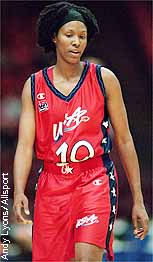


|

|
Tuesday, September 19
Holdsclaw must adjust to another level
Associated Press
She has gone from being the brightest star in her own world to
just one of many stars in another, from the go-to player to just
another option.
|  | | Chamique Holdsclaw thinks she could take over a game -- but it's not necessary on this team. |
By all accounts, Chamique Holdsclaw is handling that change
well.
Holdsclaw once was the dominant player in college women's
basketball. Twice the national player of the year. Three times a
first-team All-American. The leader on a Tennessee team that won
three straight national championships.
She became an instant star in the WNBA as well, winning the
league's rookie of the year award in 1999, leading the Washington
Mystics in scoring this year and starting in the All-Star game.
Now she's with the U.S. national team training for the Olympics
next month and it's all different. Holdsclaw, 23, is on a team
loaded with stars, all older and more experienced. Six of them
already have played in the Olympics. One of them, guard Teresa
Edwards, has played in four.
"This is a tough level to play at," U.S. coach Nell Fortner
said. "Look at all those great players. You don't want to go out
there and mess up in front of anybody. It's a tough place to be,
but she's done a good job of handling it."
At Tennessee, teammates always counted on Holdsclaw to bail them
out of a jam. Give her the ball and get out of the way. When she
wanted, she could take over a game.
Holdsclaw feels she could do that with this team if needed. She
also knows that's not often necessary, not when you have Sheryl
Swoopes slashing to the basket or Lisa Leslie, Natalie Williams and
Yolanda Griffith posting up inside or Katie Smith and Ruthie
Bolton-Holifield spotting up for 3-pointers.
"On any given night, anybody on our team can get you 20 points
and 10 rebounds," Holdsclaw said. "One person doesn't have to do
everything."
So Holdsclaw finds ways to put her immense talent to the best
use. Sometimes it's rebounding, sometimes it's scoring, sometimes
it's playing defense or setting screens. Other times it's simply
offering encouragement from the bench.
Broader in the shoulders and more heavily muscled than the
slender kid who played in college, Holdsclaw is averaging 8.3
points and 4.8 rebounds for the U.S. team. Those numbers pale
beside the standards she set elsewhere, but she's OK with that.
"We all have to sacrifice on this team," Holdsclaw said.
"Everybody's used to playing 30 minutes a game, but here,
everybody is not going to get that opportunity. But just to be
here, we are the 12 best, the 12 best in the world.
"We're not worried about how many minutes we play, who's happy
and who's not. We have to do this together. If your part is a small
part, it's going to be a big part in getting us that gold. That's
the one thing special about this team. We all know we can play. We
respect each other. We know we have to get the job done together."
The importance of that attitude was driven home from the time
Holdsclaw first became part of Team USA. After her sophomore year
at Tennessee, Holdsclaw was named to the team that would play in
the qualifying tournament for the world championships. At 19, she
was the team's youngest player and only collegian.
In stepped Edwards to show her the way.
"She became kind of a mentor to me," Holdsclaw said. "She
rides me and says things, but I know deep down inside she wants to
see me grow as a player. If I made a lazy pass, T was there to tell
me about it. If I didn't hustle, she was there to tell me about it.
"She said you've got to go out there and work hard and take
yourself to that next level. You can't pace yourself. I think I'm
learning that day by day."
Holdsclaw averaged team highs of 19 points and 6.2 rebounds in
the qualifying tournament. The following year, she averaged 10.9
points and 5.4 rebounds as the United States went 9-0 in the world
championships to win the gold medal.
Fortner said Edwards' guidance was instrumental in Holdsclaw's
performance.
"T would have done that with any youngster. It just happened to
be someone who has tremendous talent and needed to be brought
along," Fortner said. "I think that gave her a lot of confidence
for this level."
Edwards said she just did what others had done for her. In 1984,
Edwards was the youngest member of the Olympic team and was
grateful for the help she received from Lynette Woodard and Janice
Lawrence.
"They kept me going the right way," Edwards said. "They
constantly talked to me, constantly laughed and had fun with me.
They taught me how to enjoy the game on and off the court with hard
work. I'm in debt to them so it's only fair that, hopefully, I pass
something on to somebody."
Even with Edwards' help, the transition to international
basketball was a challenge. The court is slightly smaller than in
the WNBA or college, but the ball is bigger, the lane wider and the
3-point arc farther out.
"It's still difficult," Holdsclaw said. "Definitely it's a
learning process. We just play a different style of basketball. You
have to sharpen up on your fundamentals and try to play really
smart.
"I know sometimes as a young player I'm going to make mistakes,
but you can't worry about that. You've just got to go out there and
try to play hard on every possession."
|  | |
|






